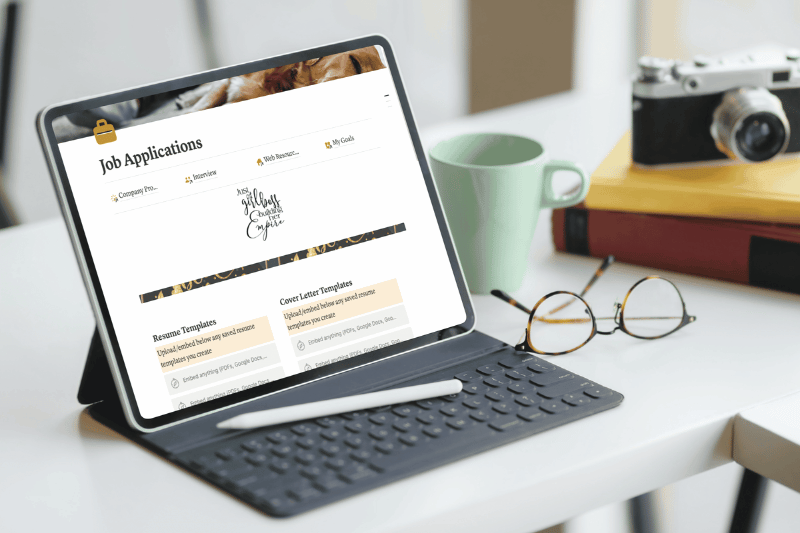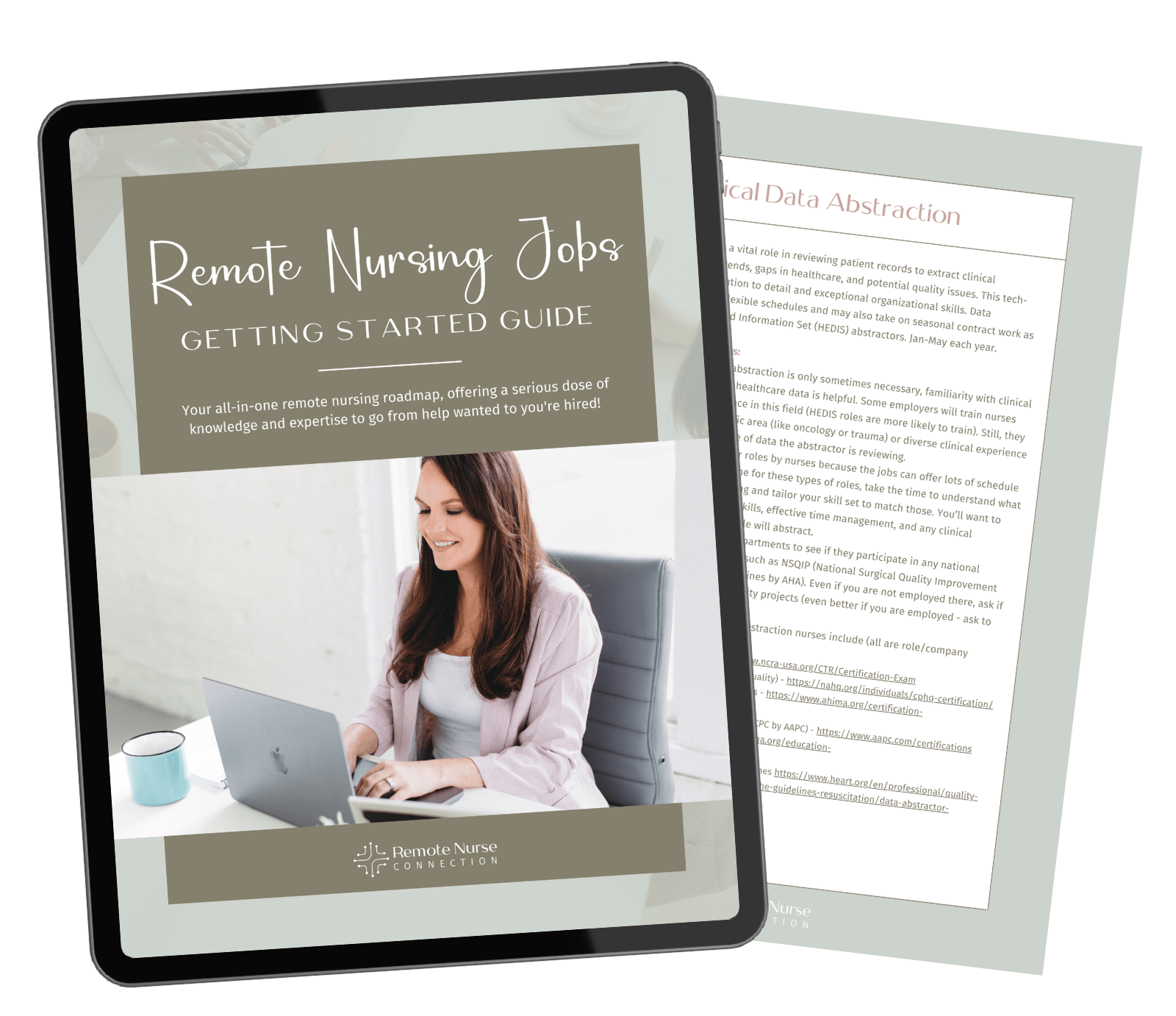
Alright, if you’re here, there’s a good chance you’re fed up with the hustle at the bedside, maybe feeling the weight of burnout, and ready to look into different types of remote nursing jobs. I get it, sometimes, the next move is all about just getting out. Most nurses start by typing “remote nurse” into Indeed or LinkedIn and hitting “apply” on anything that seems like it might be a good fit.
But let me stop you right there. I know you’re done with the stress of bedside nursing, but before you dive in, it’s worth taking a second to really think about what kind of remote nursing job is going to work out best for you. The last thing you want is to spend all this time applying and interviewing for another job you’ll end up frustrated and unhappy at.
Not every remote role will fit what you’re looking for or give you the kind of day-to-day that will actually work for your life. So, if you’re serious about finding something remote that fits, start with this: ask yourself what type of day you want and how much patient/people interaction (or lack of it) you want in your next role.
I like to break it down into three types of remote nurses: no to low phone time, heavy phone time, or a mix of both. These categories aren’t set in stone, and types 2 & 3 can greatly differ based on the employer but they’re a great place to start! The goal is to help you filter through all of the different options that align with what you actually want from a remote nursing job.
Alright, now that you’ve got a sense of where to start, let’s talk more about these three types of remote nursing roles. Here are some questions to ask yourself about what kind of day-to-day work sounds like a good fit for you.
Do you want minimal people or patient interaction? If yes, you’re type 1.
Do you love working with people & need lots of daily social/people interaction? Head down to type 2.
Or maybe you’re somewhere in between, where a mix of both could work. Last but not least – check out type 3 options.
Remote Nurse Type 1: No to Low Phone Time
If you’re already feeling done with constant interaction and want a role where you can work more independently, this might be the sweet spot for you. Think of these roles as mostly behind-the-scenes, where your focus is on data, documentation, or review, often with little to no patient or provider calls.
Here are some titles to look for if low phone time sounds perfect for you (and check out our post on the 10 Best Remote Nursing Jobs for Introverts!):
- Quality Improvement or Nurse Abstractor or Clinical Data Abstractor: Nursing roles in the quality umbrella can vary drastically based on the hospital, company or health plan you work for. You’ll be involved in processing both data, such as NDNQI metrics, or possibly tracking falls or medication events. Often at hospitals, nurses interact with Risk Management/Legal, and nursing leadership, especially in response to regulatory requirements from The Joint Commission or state agencies like DOH or CMS. Abstraction roles fall under the quality nursing specialty. In these roles, your day will focus on reviewing medical records and abstracting data that’s used for quality improvement and compliance purposes. It’s detailed work but low on direct interaction. Occasionally, some HEDIS abstraction roles will require phone calls to provider offices to request medical records but there isn’t any patient interaction in those jobs. Learning about data analytics and how to use Excel is very helpful for these types of remote nursing jobs. Check out the nurse data abstraction career guide here.
- Utilization Review Nurse (Retrospective Review): Here, you’ll assess medical records to assess if services were necessary based on a set of guidelines like Interqual or MCG. Retrospective review means you’ll mostly be working independently, analyzing documentation rather than making calls. Other roles in utilization review (prior authorization and concurrent review, will have a mix of phone required phone time, depending on the company/job). Read our UR nurse career guide here.
- Clinical Documentation Specialist (CDI): As a CDI nurse, you’ll audit documentation for accuracy (looking for anything that needs to be clarified or is missing) for coding and billing compliance. Typically, nurses in these roles will be chatting with team members & providers via chat messaging rather than picking up the phone. Most of your day will be spent reviewing the records, submitting and following up on queries sent to providers for documentation. This role uses a good mix of nursing clinical and medical billing/coding knowledge. Check out our CDI nurse career guide here.
- Auditor (FWA, DRG Auditor, Underwriter, Clinical Data Reviewer): Nurse auditors identify discrepancies in medical records and medical/billing coding to ensure accuracy and uncover fraud, waste, or abuse practices. Most of this work is independent and analytical. To learn more about FWA roles for nurses, check out this post.
- Legal Nurse Consultant: If you’re detail-oriented and interested in legal processes, this role might be a great fit. Nurses review legal cases, providing their expert nursing opinions on the medical records—no patient interaction required. You can also work as an expert witness in this field, which would require more interaction with people as you would be providing expert testimony in a legal case. This role takes a different approach to getting started, and nurses typically learn best by subcontracting to other LNCs. You can read more about what legal nurse consulting is here.
- Freelance Nurse Writer: This is another nursing role often overlooked like, legal nursing, but truly offers so much flexibility and is great for introverted nurses. Again, this career path in nursing isn’t going start off like traditional ones but if you have an entrepreneurial-type spirit and enjoy writing, it’s going to be a good one for you! Savvy Nurse writer has a free FB Group to join, as well as a membership (including jobs) to help you on this non-traditional nursing career path.
- Nursing Informatics: I struggled with which type to place this specialty in because there are so many different options that span all three. You can work behind the scenes in building documentation or data analytics, having very little people interaction, or be very involved in client-facing roles such as project management, consultant, liaison/coordinator, or education. I’ve worked in Nursing Informatics roles in the past and plan to write more about this specialty in the future, so check back to find out more! Here are a few resources to learn more about all the different areas in this specialty: ANIA and Day in the Life video.
Breaking Into Case Management or Utilization Review?
Most nurses hit a catch-22: employers want MCG/InterQual certification, but you need a job to get trained. Case Management Institute (CMI) solved this problem.
They’re the ONLY organization partnered with MCG Health that lets you get certified before landing the job. After completing their Utilization Management & MCG course, you’ll be eligible to take the MCG Certification Exam, no employer sponsorship needed. Plus, their courses are accredited for nursing continuing education hours.
Ready to break the cycle? Use code ANDREA10 for 10% off your CMI courses.
Remote Nurse Type 2: Social Interaction
For nurses who get their energy from interacting with others, these roles will keep you connected to patients, providers, or even families, depending on the setting. Sometimes case manager roles also include some duties that overlap with utilization review nurses. These roles are still remote (or hybrid), but expect a lot of engagement through phone or video calls. They’re great for nurses who miss the connection with patients but want the flexibility of working from home.
Check out these job titles if you’re looking for a high-interaction role:
- Telephonic Care Manager or Case Management Nurse: This is an excellent option if you enjoy working one-on-one with patients. You’ll be coordinating care, managing follow-ups, and educating patients over the phone, which is perfect for building relationships remotely. Sometimes case manager roles will include some duties that utilization review nurses often perform, it really just depends on the company and/or the team you are hired for. These roles can vary drastically based on the company and teams but generally require a lot of daily interaction between people. I highly recommend taking the free course offered by the Case Management Institute (CMI) to learn more about the differences between nurse case managers and utilization review. To learn more about getting started in remote case management roles, read this post.
- Telehealth Nurse/Telephone Triage Nurse: In triage roles, you’re assessing patients, offering guidance, and managing their immediate concerns. These roles are offered by insurance companies, physician offices, hospitals, and private telehealth companies. You’ll be on the phone often, using your clinical skills to support patients right when they need it.
- Nurse Coach or Health Coach: Coaching roles allow you to guide patients on lifestyle changes and health improvements. It’s a highly interactive role with a strong focus on patient motivation and support. You could be supporting patients dealing with new or chronic health conditions in a variety of specialties.
- Transitions of Care Nurse: Helping patients move smoothly from one stage of care to the next is key here, making sure they understand their discharge instructions and preventing readmissions. It’s hands-on but all over the phone.
- Clinical Health Advocate: As a health advocate, you’ll work with patients and families to navigate the healthcare system (either at a health plan or hospital), explain their benefits, and advocate for their care. You could be involved in helping to resolve complaints and disputes as well. It’s about supporting patients on a deeper level, understanding the system, and being a voice on their behalf. It’s very similar to a clinical coordinator/navigator role but will usually be heavier with people interaction.

Remote Nurse Type 3: Mix It Up
If you’re not fully ready to leave patient interaction behind but want a balance between paperwork and calls, then a mixed role might be a perfect fit. These jobs give you the chance to interact when needed but also allow for quiet, focused work on other days.
Here’s a look at some mixed-interaction roles:
- Nurse Educator: As an educator, you’re training other nurses or patient populations, sometimes on calls and sometimes creating materials or resources. This can be both fulfilling for having social interaction and flexible in how you interact day-to-day. This role could also be very heavy with phone time, depending on the company and role specifics, but some will offer some downtime for education planning that doesn’t involve social interaction. These roles could be focused solely on patients, the medical team, or a mix of both. Biotech and medical device companies often hire nurses for these roles because they understand the products/services offered and how to communicate with patients and fellow medical personnel easily.
- Clinical Care Coordinator or Navigator: In this role, you’ll help patients manage their care plans, which includes a mix of coordination, education, and some outreach. It’s less “on-the-phone” time than a pure care manager role but still keeps you engaged with patient care and providers. These roles are often offered by hospitals in specialties like cardiology, surgery, or oncology to help patients navigate the care process, ensuring they get appointments scheduled, get education, and have a familiar person to contact for questions.
- Clinical Reviewer (Prior Authorization/Concurrent Review): If you like using your clinical judgment and keeping up with guidelines, this role is a mix of reviewing cases and contacting providers for clarifications or updates. You’ll find a balance of review work and a bit of people interaction. Learning about Interqual and MCG guidelines will be beneficial for these roles and CMI offers the only course (Utilization Management & MCG) outside of an employer where nurses can obtain eligibility to take the MCG certification exam.
- Remote Patient Monitoring Nurse (RPM): RPM nurses review patient data remotely, often for those with chronic conditions or post-hospital discharge. You’re monitoring their data and reaching out if there are any red flags, so you’ll have interaction but not an overwhelming amount.
- Population Health Nurse (mix of Public Health): This role is about working with larger groups, identifying health patterns, and creating action plans. You might have some direct patient or provider interaction but also focus on data and strategy to impact health on a bigger scale. This is another role that, depending on the company, could require heavy phone time or overlap with some case management duties, so it’s best to discuss typical “day in the life” expectations during the interview process. The AACN has some great resources to learn about population health nursing.
- Risk Management Nurse: In this role, nurses work on identifying risks, improving safety protocols, and occasionally interacting with providers or patients as needed. It’s a mix of administrative work and some people communication when needed. This role can overlap with some legal nurse consulting duties, depending on the hospital or company’s needs, or also overlap under the Quality types of nursing jobs.
Each of these types of “categories” offers something unique, and knowing which one fits your strengths and preferences will make your remote nursing job search so much easier. If you can start with this question—“What level of interaction am I looking for?”—you’ll avoid applying to roles that don’t match your goals and save time in finding the right remote nursing job for you!
Find the right work from home nursing opportunity for you
The best part about remote nursing is that there’s a job out there for just about every type of nurse. Whether you’re looking to step away from patient interaction, thrive on connection, or want a balance of both, it’s possible to find a role that aligns with your personality needs. Avoid the common pitfall of applying to roles out of desperation and set yourself up for success by spending some time researching what roles will fit your preferences. It’s all about finding something sustainable and suited to you, and with a little patience and planning, you’ll be in the remote role that works with your life, not against it. So, which type of remote nurse are you aiming to be?
Where to Find Work From Home Nursing Jobs
Remember, these remote nursing jobs can be found in a variety of places; insurance companies, hospitals, medical device companies, biotech and pharmaceutical companies. There are lots of different job titles for these remote positions! Check out the free Remote Nurse & Biotech Job Board to help you quickly find these opportunities!
Remote Nurse Connection is proudly Ad-free. All opinions are my own. This post may contain affiliate links, which means I’ll receive a commission if you purchase through my link, at no extra cost to you. As an Amazon Associate, I earn from qualifying purchases. Please read full disclosure here.
Browse A Bit More On the Blog…
Types of Biotech Nursing Jobs Explained
Oct 11, 2024
With so many bedside nurses looking for a career change to reduce burnout, biotech nursing jobs are gaining traction, offering nurses the chance to leverage their clinical experience in new and exciting ways. “But what would I be doing exactly?” That’s one of the...
Personal Finance for Nurses: 10 Tips from a Nurse-Turned-Entrepreneur
Sep 26, 2024
Has money ever kept you from achieving your goals? Have you ever felt stuck because your personal finances are out of control? You aren’t alone. On my professional journey, I have met many nurses who felt as if they were slaves to their money. Some of the most...

Your Insider Connection to Remote Nursing Success
I help nurses find the best-fit remote jobs that bring flexibility, personal freedom and alignment, and continued professional growth.
CATEGORIES

Free Getting Started Guide
FOR LANDING A
REMOTE NURSING POSITION!


